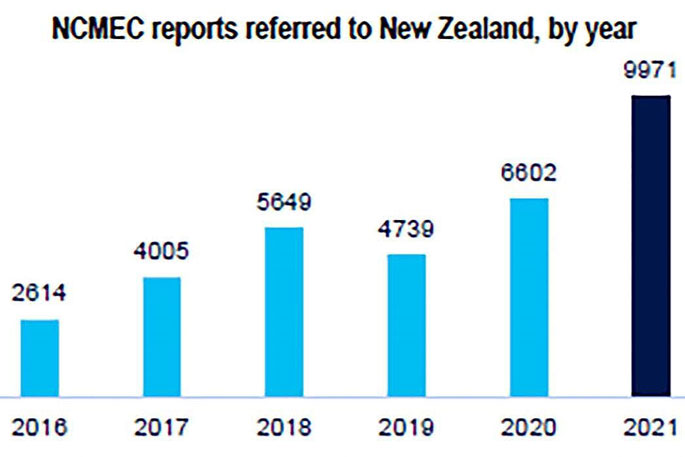The number of victims – and perpetrators – of online child exploitation in New Zealand has more than doubled since 2019, mirroring a global spike in offending since the start of the Covid-19 pandemic.
Data obtained by Stuff from the National Centre for Missing and Exploited Children, which refers cases to New Zealand agencies when either victim or offender is believed to be located here, revealed 9971 referrals were made in 2021.
That's a 51 per cent spike on the year earlier figure of 6602, and a staggering 281 per cent increase from 2016 with 2614 referrals.
Detective Sergeant Jodie Lyons, the officer in charge of the Online Child Exploitation Across New Zealand specialist unit, says they 'continue to see increasing year-on-year reporting of New Zealanders using online services for child sexual exploitation”.
'Whilst we have seen an increase in reporting, it is unclear whether the Covid-19 response and restrictions have had a direct impact.”
Lyons says New Zealand adopts a tri-agency response to online child exploitation investigations, utilising teams from Police, New Zealand Customs and the Department of Internal Affairs.
She says all three agencies have seen an increase in reports.
'The three agencies remain concerned at the reported increase in live-streaming of child sexual abuse, especially from regions with vulnerable populations.”
Lyons says while the scale of the issue of online child sexual exploitation is 'daunting globally”, New Zealand works closely with international partners and service providers to 'better protect children, not only in New Zealand but internationally”.
'As technology evolves, law enforcement continue to face challenges investigating online offending, particularly in relation to end-to-end encryption.
'We remain committed to strengthening relationships with industry to ensure those committing these insidious crimes are held to account.”
 The huge spike in offending, and victims, is clear in the data from the National Centre for Missing and Exploited Children of referrals made to New Zealand agencies.
The huge spike in offending, and victims, is clear in the data from the National Centre for Missing and Exploited Children of referrals made to New Zealand agencies.
The global nature of the problem is also highlighted by Interpol secretary general Jürgen Stock, who describes a 'massive increase in online child sexual abuse and exploitation” since the Covid-19 pandemic.
Speaking at a panel discussion on cybersecurity at the World Economic Forum in Switzerland, Stock says reporting by private industry and public hotlines, in addition to law enforcement exchanges, has shown a consistently rising number of online child abuse images, with 2021 'the worst year on record”.
He also warns the growth of internet connectivity will see more children abused and exploited online.
'Every image, every video is evidence of a horrific crime with a real victim who suffers for the rest of their life,” says Stock.
'The sheer volume of images is already overwhelming law enforcement worldwide. Unless the public and private sectors do more to unify our efforts, we will only see this disturbing upward trend in cases grow.
'If we are to more effectively tackle online child sexual abuse and exploitation, we cannot waste time duplicating efforts or not sharing information. Children's lives are at risk.”
Interpol says seven victims of online child exploitation are identified every day, and there has been a significant rise in ‘self-generated content', when a child is groomed or coerced into creating images and videos of their abuse.
Live-streaming of exploitation for payment has also increased.
Stock says Interpol's International Child Sexual Exploitation database provides a global platform to help identify victims and their abusers.
The database avoids duplication of effort and saves precious time by letting investigators know whether a series of images has already been discovered or identified in another country, or whether it has similar features to other images.
Every day, the ICSE database helps investigators around the world identify an average of seven child abuse victims, and since its creation has helped identify and document more than 12,500 offenders.



0 comments
Leave a Comment
You must be logged in to make a comment.